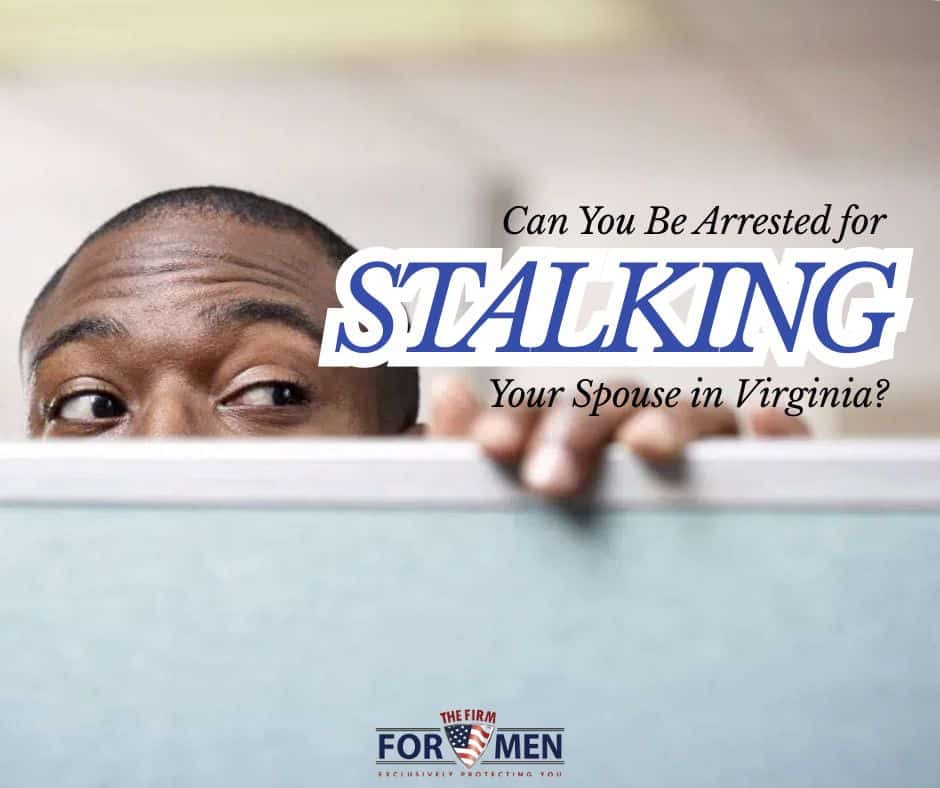You might assume stalking is something that happens between strangers in dark parking lots or online forums. But in Virginia, if your spouse—or even your ex—accuses you of stalking, you can face serious criminal and family law consequences. Under Virginia law, stalking is a criminal offense, and yes, you can be arrested and charged even if the person accusing you is your wife.
This guide explains what Virginia law says about stalking, how it applies within marriage, what penalties you could face, and how to defend yourself if you’ve been accused.
Jump to a Section
- How Virginia Defines Stalking
- Misdemeanor vs. Felony: The Penalties You Could Face
- How Warnings and Repeated Contact Escalate the Charges
- Spousal or Marital Context: Does It Change Anything?
- Legal Defenses You Can Raise
- Steps to Take If You’re Under Investigation
- The Intersection of Stalking Claims and Family Law
- Why Men Need a Skilled Defense and Family Law Team
1. How Virginia Defines Stalking
Virginia Code § 18.2-60.3 defines stalking—officially called criminal harassment—as any behavior that occurs more than once, directed at another person, and intended to cause or reasonably expected to cause fear of death, sexual assault, or bodily injury to that person or their family.
Even if you didn’t mean harm, your actions could still qualify as stalking if your spouse reasonably perceives them as threatening.
Common examples include:
- Following or appearing at places where your spouse is present
- Repeatedly calling, texting, or messaging despite being asked to stop
- Monitoring or tracking your spouse’s movements
- Leaving unwanted gifts or notes
The key element is intent—or awareness—that your actions cause fear or distress.
2. Misdemeanor vs. Felony: The Penalties You Could Face
A first stalking offense in Virginia is typically a Class 1 misdemeanor, which can carry:
- Up to 12 months in jail
- Fines up to $2,500
- A permanent criminal record
However, if you continue stalking after receiving a warning or protective order, the charge can escalate to a Class 6 felony, which may include:
- One to five years in prison
- Additional fines
- Probation, loss of firearm rights, and long-term legal restrictions
Even a misdemeanor conviction can affect employment, custody, and reputation. A felony conviction can alter your life completely.
3. How Warnings and Repeated Contact Escalate the Charges
Stalking often escalates through repetition. A single phone call or visit may not qualify—but once your spouse tells you to stop, continuing contact creates evidence of intent.
That can include:
- Repeated calls or texts
- Driving by her home or workplace
- Showing up at events “coincidentally”
- Using others to deliver messages
Even indirect communication can count if it causes fear. Once there’s a pattern, prosecutors may have a strong case.
4. Spousal or Marital Context: Does It Change Anything?
You might think marriage gives you some immunity from stalking charges. It doesn’t. In Virginia, the law applies equally to spouses and former spouses.
That means:
- Contacting your wife repeatedly against her wishes may still qualify as stalking.
- A separation agreement or protective order can heighten your legal exposure.
- Continuing to monitor, follow, or message her can become a criminal offense.
Marriage can sometimes complicate things—you may have legitimate reasons to communicate about finances or children. But once a court order or a clear boundary exists, ignoring it puts you at risk.
5. Legal Defenses You Can Raise
An experienced Virginia defense attorney may use several arguments to protect you, including:
- No intent to harass or threaten: You didn’t know your actions caused fear.
- Lack of credible evidence: Your spouse misinterpreted your behavior.
- Legitimate purpose: Communication was about children, property, or legal obligations.
- Unreasonable perception: A “reasonable person” wouldn’t have felt threatened.
Your attorney can also challenge inconsistencies in your spouse’s claims or introduce evidence—texts, witness statements, or GPS data—that contradicts the accusation.
6. Steps to Take If You’re Under Investigation
If you believe your spouse has accused you—or might accuse you—of stalking:
- Stop all direct contact immediately.
- Do not respond to messages, even to defend yourself.
- Hire a Virginia defense and family law attorney right away.
- Document everything: dates, times, and any evidence supporting your innocence.
- Avoid social media posts about your spouse or your case.
- If police contact you, don’t speak without legal counsel present.
Prompt action can mean the difference between clearing your name and facing arrest.
7. The Intersection of Stalking Claims and Family Law
Stalking accusations often surface during divorce or custody battles. These claims can:
- Influence custody and visitation rulings
- Lead to temporary or permanent protective orders
- Damage your credibility in court
Even false or exaggerated claims can sway a judge’s perception. That’s why it’s critical to coordinate your criminal defense with your family law case. Both courts affect your future—and your children’s.
8. Why Men Need a Skilled Defense and Family Law Team
Stalking allegations carry severe consequences. They can ruin reputations, careers, and family relationships. For men in Virginia, the challenge is even greater—courts can misinterpret persistence or emotional communication as harassment.
At The Firm For Men, we understand these complexities. We represent men accused of stalking, harassment, or domestic offenses while protecting their parental and constitutional rights. Our attorneys know the nuances of Virginia’s criminal and family laws and how to keep one from sabotaging the other.
If you’ve been accused or fear you may be, call (757) 383-9184 today. We’ll evaluate your case, defend your rights, and help you move forward safely.

